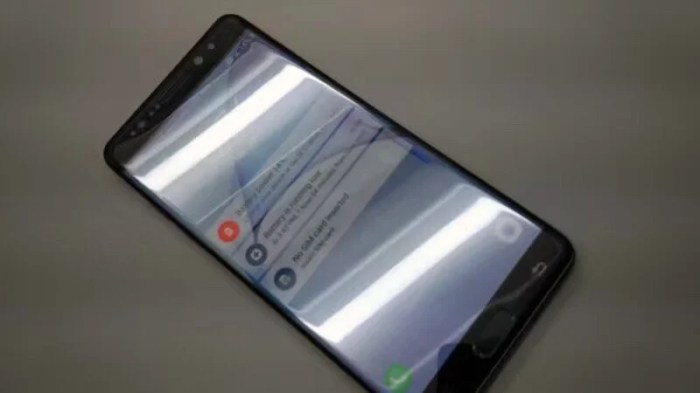Leaked pictures confirm Galaxy Note 7 iris scanner takes center stage, sparking debate about security, privacy, and the future of biometric authentication. The images, reportedly obtained from an anonymous source, depict the Note 7’s iris scanner in detail, revealing its sophisticated technology and raising questions about Samsung’s security protocols. The leak has ignited a firestorm of discussion, with experts weighing in on the implications for both the company and the broader mobile device landscape.
The Note 7’s iris scanner is a cutting-edge biometric authentication system that uses the unique patterns in a user’s iris to unlock the device. This technology is touted as more secure than traditional methods like fingerprint scanning, as it is harder to replicate and more resistant to spoofing. The leaked images suggest that the Note 7’s iris scanner is indeed sophisticated, utilizing a combination of hardware and software to accurately capture and analyze iris patterns. However, the leak also raises concerns about the security of Samsung’s internal processes, prompting questions about how the images were obtained and what other sensitive information might be at risk.
The Galaxy Note 7 Iris Scanner: Leaked Pictures Confirm Galaxy Note 7 Iris Scanner
The Galaxy Note 7, released in 2016, was one of the first smartphones to feature an iris scanner for authentication. This innovative technology offered a secure and convenient way for users to unlock their devices and access sensitive information.
Iris Scanner Functionality
The iris scanner on the Galaxy Note 7 used a near-infrared camera to capture a detailed image of the user’s iris. The iris, the colored part of the eye, is a unique and complex pattern that can be used for identification. This unique pattern is then compared to a stored template, allowing the device to verify the user’s identity.
How the Iris Scanner Works
The iris scanner works by utilizing a near-infrared camera that emits invisible light onto the user’s eye. This light illuminates the iris, allowing the camera to capture a high-resolution image of the unique pattern. The captured image is then processed by a dedicated algorithm that analyzes the iris’s intricate details, such as the shape, texture, and color distribution. This analysis generates a unique digital representation of the iris, known as an iris template. When the user attempts to unlock the device, the iris scanner captures a new image of their iris and compares it to the stored template. If the two patterns match, the device is unlocked.
Security Features of the Iris Scanner, Leaked pictures confirm galaxy note 7 iris scanner
The iris scanner offers a high level of security compared to other authentication methods like fingerprint scanning.
- Unique and complex pattern: The iris is a highly complex and unique structure, making it extremely difficult for unauthorized individuals to replicate or forge.
- Difficult to spoof: Unlike fingerprints, which can be easily replicated using a mold or a photograph, iris patterns are significantly harder to spoof. The use of near-infrared light and sophisticated algorithms makes it challenging to create a fake iris that can deceive the scanner.
- High accuracy: Iris scanners have a very high accuracy rate, typically exceeding 99%. This means that the system is highly reliable in correctly identifying authorized users and rejecting unauthorized attempts.
Last Point
The leaked pictures of the Galaxy Note 7’s iris scanner have ignited a complex discussion about security, privacy, and the future of biometric authentication. While the images offer a glimpse into the technological prowess of Samsung’s latest flagship device, they also highlight the vulnerability of even the most secure systems to breaches. The leak serves as a stark reminder of the importance of robust security protocols and the ongoing need for vigilance in protecting sensitive data in the digital age. As biometric authentication continues to evolve, it is essential to address the ethical considerations and potential challenges associated with this technology, ensuring that its benefits are realized while safeguarding user privacy and security.
The leaked pictures confirming the Galaxy Note 7’s iris scanner have generated a lot of buzz, with many speculating on its accuracy and security. It’s interesting to see how technology is advancing, and it makes you wonder what the future holds for biometrics.
It’s also interesting to see how the gaming community is addressing toxic behavior, with initiatives like the wow silence penalty for toxic players system. Hopefully, these initiatives can create a more positive and inclusive environment for all players. It’ll be interesting to see how Samsung’s new iris scanner technology is received by the public, and if it can live up to the hype.
 Securesion Berita Informatif Terbaru
Securesion Berita Informatif Terbaru
